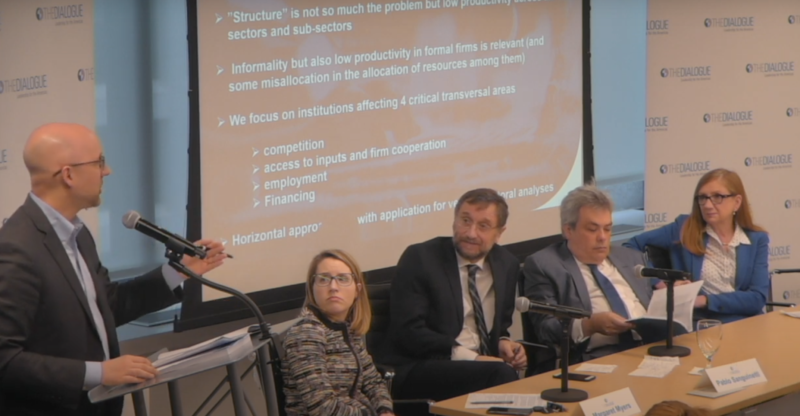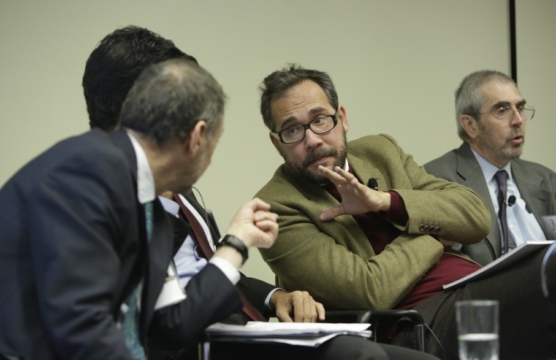Mexico: How Far Have its Institutions Really Come?
The question remains if Mexico has achieved a degree of institutional development consistent with its participation in those organizations.
On April 26, 2019, the Inter-American Dialogue and CAF – Development Bank of Latin America hosted “Institutions for Productivity: Towards a Better Business Environment in Latin America” to present and discuss the underlying challenges and policy recommendations found in CAF’s flagship report. The report analyzes the region’s economic institutions and their impact on productivity and development. The discussion was moderated by Margaret Myers, director of the Asia & Latin America program.
Pablo Sanguinetti, chief economist and vice president of knowledge at CAF, began the event with a formal presentation of the report. Output per capita of the LAC region compared to the United States has remained stagnant for the past 50 years, while other developing regions have improved on this statistic. Instead of pointing the finger at physical or human capital development, the report indicates that the major obstacle to growth in Latin America is total factor productivity, an issue that implicates all major sectors in the region. The report proposes four primary institutional areas of interest to increase productivity: competition; access to inputs and cooperation; labor relations; and financing. According to Sanguinetti, “the problem with productivity in Latin America is not what we produce, but how we produce it.” By disaggregating the components of economic institutions in terms of their effect on productivity, the report is able to diagnose specific areas for policymakers to address, such as informality, regulatory frameworks, employment, and transparency.
Sebastián Galiani, professor of economics at the University of Maryland, was “sympathetic” to the report’s tendency to simplify institutional theory for policymakers, who are often concerned with tangible, short-term benefits. With regard to productivity, he declared that Latin America has “serious measurement problems,” which stand in the way of developing clear-cutting economic reforms. Galiani described how improvements in the credit market fostered development in Chile, while a relative lack of credit and access to financing in Argentina had the opposite effect. Finally, he warned against the adoption of highly specific and hyper-focused laws and reforms, declaring that since “we live in a rent-seeking society,” interest groups may take advantage of loopholes that open up when those policies interact with the broader institutional environment.
Anabel González, senior fellow at the Peterson Institute for International Economics, applauded the report’s focus on the underlying issues of Latin America’s “lackluster” economic performance, which are especially significant as the peak of the commodity super cycle wears off. She warned against the deterministic nature of terms such as “productivity trap” and urged policymakers to focus on structural issues using an integrated approach instead of focusing on specific sectors. González also drew attention to the region’s underperformance in global value chains. Latin American countries should address tariffs and other trade barriers, foreign direct investment, and competitiveness in the services sector in order to increase productivity. Finally, she brought up several points relating to the productivity of institutions in the region, including productive cities, infrastructural investments, digital technologies, and external drivers of reform such as OECD membership.
The multisectoral approach needed to promote productivity gains in Latin America requires buy-in from both public officials and the private sector. Welby Leaman, senior director of global government affairs (Americas & Africa) at Walmart, described his company’s experience engaging with the “three economies” of Latin America: formal, informal, and the gray area in between, all of which are governed by relatively weak and corrupt institutions. These institutions, according to Leaman, sap productivity especially when they result in legal enforcement spending that is not coupled with reforms on the normative, institutional level. Companies such as Walmart provide formal jobs in areas ruled by informality, but they have to compete with an informal sector that has access to cheap, illegal inputs and can avoid tax payments. Advancements in rule of law and governance policies that improve institutions, with the input and support of the private sector, can improve total factor productivity and strengthen Latin American markets.
The speakers’ remarks were followed by a Q&A period with the audience. The audience asked questions regarding international trade policy, including the role of China and the WTO, as well as the political considerations of economic reform. In response, panelists proposed that Latin America overcome a lack of coordination to use its collective voice to advocate for trade stability, especially considering that the region has suffered under trade protection for decades.
The question remains if Mexico has achieved a degree of institutional development consistent with its participation in those organizations.
Despite an increased presence in the global market, Brazil’s new economic policy shows sign of protectionism and defense of traditional industries.
There is a gap between the skills that the Latin American workforce offers and the skills that companies in the region demand.
 Inter-American Dialogue
Inter-American Dialogue
